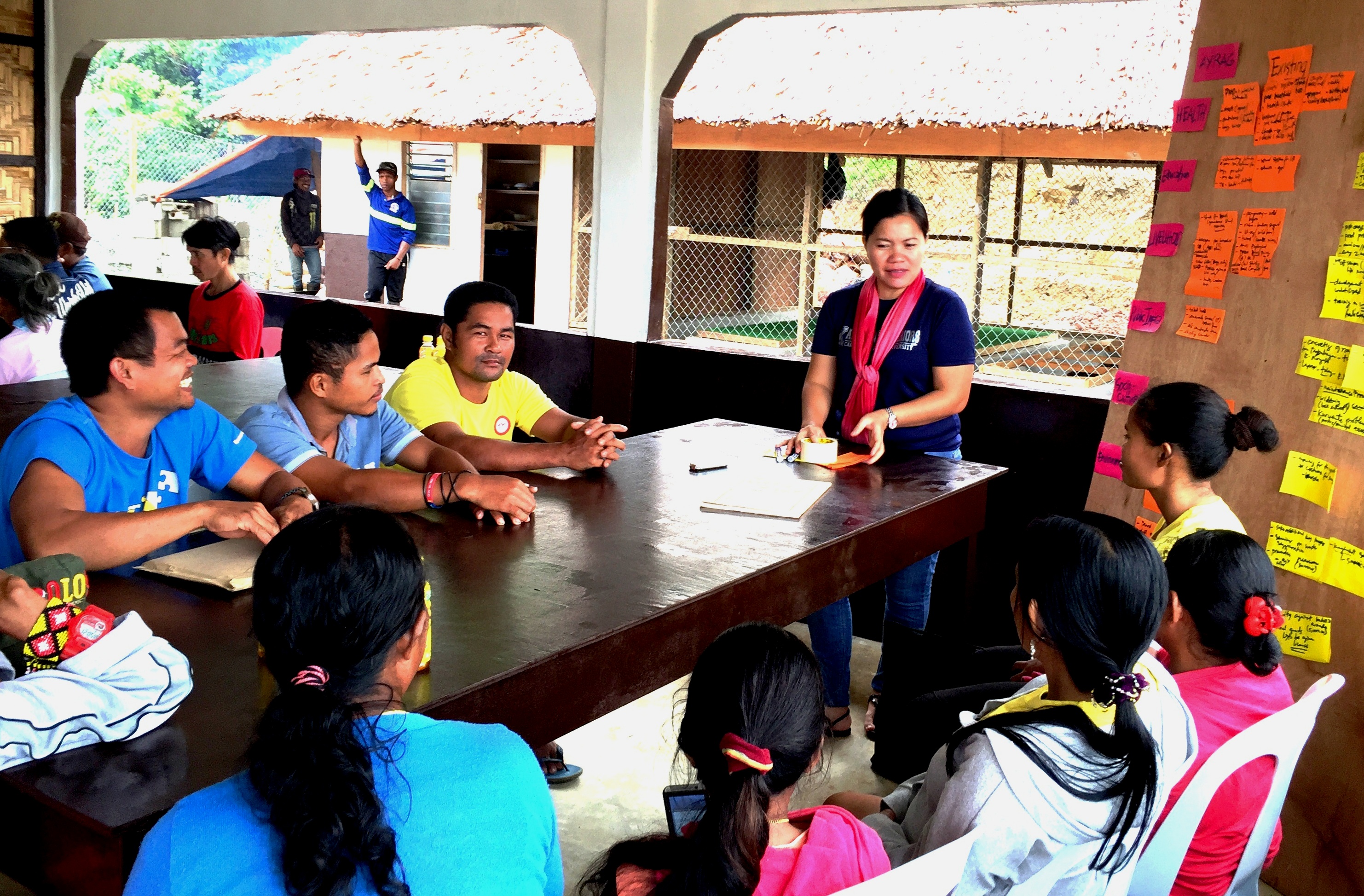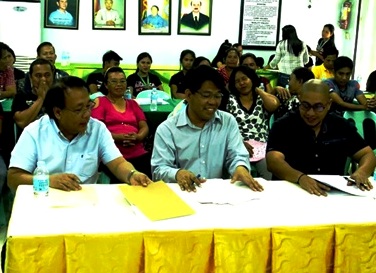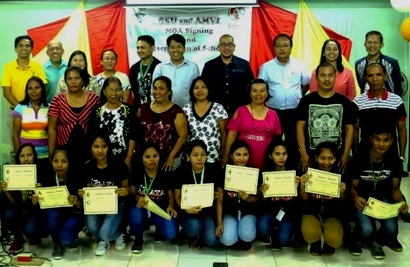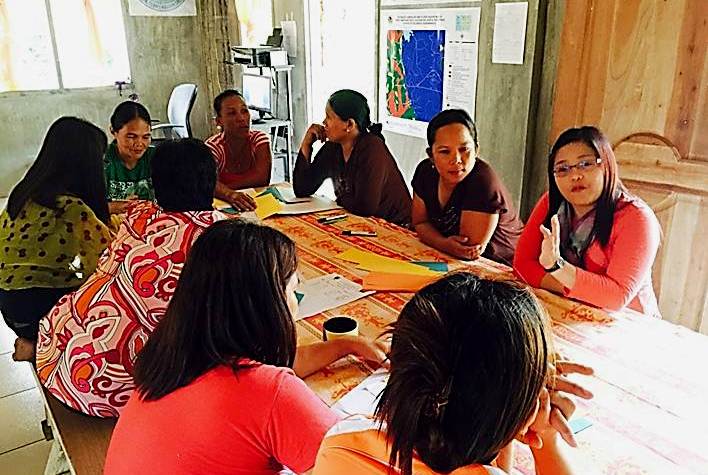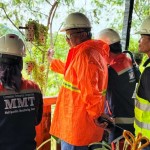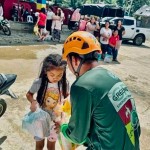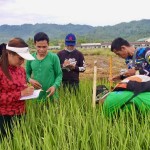-
“Change is in our hands” A CSU researcher conducts a Focus Group Discussion with the different IP organizations supported by AMVI, outlining the changes in their communities and documenting how they perceive the improvement of their conditions.
-
AMVI Management with CSU President Anthony M. Penaso PhD (center) commit to contextualize changes to the mining communities by signing the MOA on its research titled: Social Impact Assessment in Mining Communities in Agusan del Norte.
-
AMVI Management and CSU faculty together with the 13 new scholars and their parents. The scholars received certificates of scholarship grants from the company.
-
Head Researcher Lilibeth L. Manigo of CSU College of Arts and Sciences facilitates discussions with non-tribal residents and local barangay officials regarding the formulation of the qualitative survey and baseline data for the commencement of the research.
Measuring the benefits and changes to Agata’s adopted communities in the region
Butuan City, Agusan del Norte / May 2017 – On its third year of operating Tubay, Santiago, and Jabonga Municipalities in Agusan del Norte Province, Agata Mining Ventures Inc. (AMVI) embarked on a partnership with the Caraga State University (CSU) – one that aims to measure the positive changes brought by responsible mining operations to both tribal and non-tribal communities. In the undertaking, CSU will conduct a research titled Social Impact Assessment in Mining Communities in Agusan del Norte – which aims to determine the extent of satisfaction on the SDMP implementation among host and neighboring barangays of the mining company as well as to assess the perceived social impact.
The research likewise endeavors to determine the significant difference between the host and neighboring barangay as to the overall social impact assessment. With regard to gender roles, it aims to identify the roles and needs of women in the community. Finally, it will further assess the quality of life of indigenous people (IP) in mining communities, particularly in relation to the perceived social impact of royalty profit shares.
Academic approach
According to the International Principles for Social Impact Assessment (SIA), the evaluation includes the process of analyzing, monitoring, and managing the intended and unintended social consequences – both positive and negative – of planned interventions (policies, programs, plans and projects). The assessment also centers on any social change invoked by those interventions.
To date, the CSU research team has conducted an assessment of the communities’ needs through Focus Group Discussions (FGD) with the indigenous sector. By July this year, the qualitative survey will be rolled-out to all AMVI communities, throughout which the study will provide objective data to explore other means of livelihood, needed social services to be installed in the community, and recommendations on whether to continue the existing infrastructure or income-generating projects being implemented by the company.
The research seeks to remain faithful to the Principles for SIA, especially to its primary objective of fostering a more ecologically, culturally and economically-sustainable and equitable environment – one that empowers local men and women alike, minority groups and other disadvantaged members of society.
Hopeful scholars
On the same occasion, the CSU’s College of Arts and Sciences welcomed 13 AMVI scholars who come directly from Agata mining communities for the school year 2016-2017. No less than, University President Anthony M. Penaso PhD, welcomed the new aspirants and their parents into the institution.
“I am thankful to AMVI for giving the youth in our community a chance, especially my daughter,” expressed Elsa Carles from Barangay Tagpangahoy – a parent of one of AMVI’s scholars.
“We do not have the financial capacity to send her to college and we never even dreamed that this day will come. It gave us hope and a new chance of improving our lives,” she added.
Social responsibility
AMVI’s SDMP project funds are allocated to livelihood programs (21%), public utilities (20%), health (17%), information, education and communication (IEC) (15%), education (11%), development of mining technologies and geosciences (DMTG) (10%) and socio-cultural activities (6%). These directly benefit eight host and neighboring barangays within the three municipalities.
Particularly on IEC and DMTG efforts, these intend to increase opportunities and involvement of residents in creating awareness and skills training. Overall, the company ensures to augment the basic welfare of the communities to improve their way of living.
“Mining is not forever, but if we can provide projects that will bring change and improve their lives, then the industry will live forever in the children who have received education, residents who have gained technical skills, and communities who have invested wisely on livelihood,” shared AMVI General Manager Emilio Figueroa III.
Empowering IPs
AMVI has implemented its Community Resource Development Program (CRDP), which brings forward the sustainable benefits of IP Royalties received by the Mamanwa tribes to improve their livelihood, living conditions and their fellow lumads’ access to education.
“The changes we enjoy now have been our dream. It is finally in our hands – secure livelihood, the opportunity to be educated and regain our dignity since the Mamanwa tribe has been one of the poorest indigenous tribes,” said Datu Bebe of the Coro Mamanwa Tribal Organization.
According to Datu Moron of Mapaso Sector, “AMVI has infused in us a new hope, a new motivation to handle our finances and invest in our resources. Without our royalty share and AMVI’s guidance, we could not have established our agroforestry again, our women empowered and most of our youth educated.”
*******

